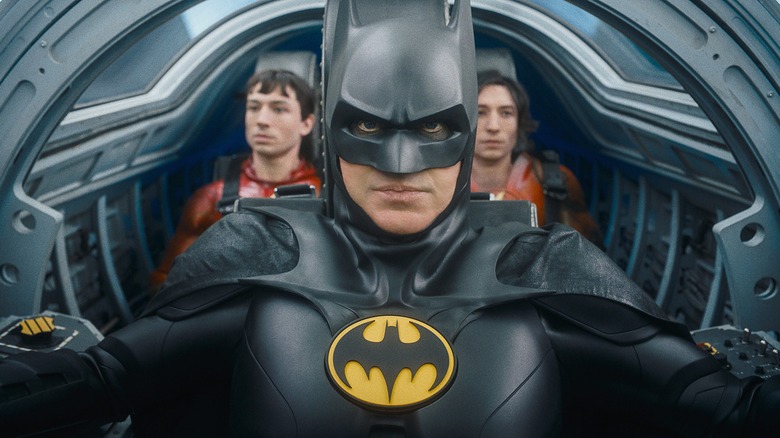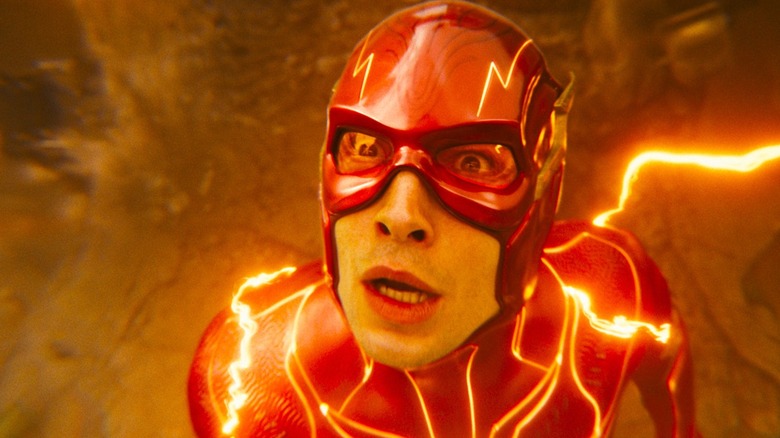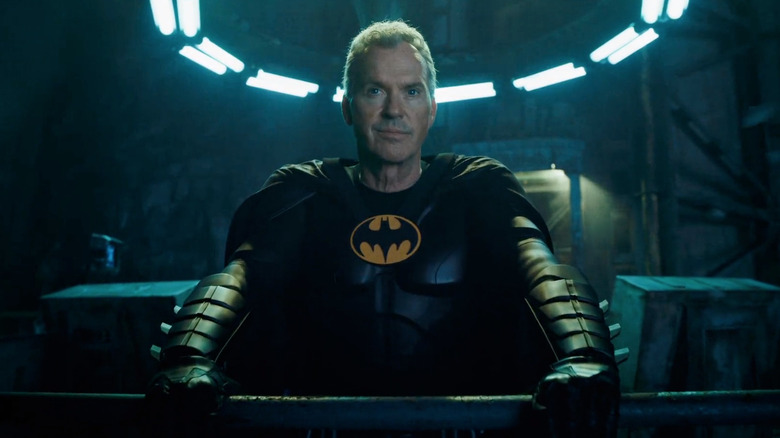The Flash Review: Muddled Multiverse
- The performances are strong
- There's a solid emotional throughline
- Overall, it's pretty entertaining
- The climax suffers from flat, ugly visuals
- The final act leaves a lot to be desired
In the nine years since embattled movie star Ezra Miller was cast to be DC's live-action Barry Allen, a Crisis-level saga has ensued, both on and off the big screen. Miller has been the center of countless crimes and controversies and the sprawling, uneven DC Extended Universe itself has drawn to a close. They've finally gotten to play "The Flash" in "It" director Andy Muschietti's new film, but instead of a solo chapter in the ongoing narrative they'd first signed on for, the first ever live-action movie about the Scarlet Speedster must act as a requiem for the so-called Snyderverse. Whether or not this film is successful on its own merits seems beside the point. It exists to function solely as a metatextual rewrite of the on-screen DC mythos, so new co-CEO James Gunn and his collaborators can start fresh, hoping to save the brand from the fractured fate it has so far endured.
Harsh realities aside, this is a movie that must stand on its own to be a satisfying experience. Whether or not it accomplishes that base-level task will greatly depend on the amount of leeway the viewer is willing to give this troubled production. But for all its positives, the fact a movie this straightforward was twisted into something so baffling and misguided is indicative of a much larger problem with these big-budget shared universes and the pitfalls of investing so heavily into them.
There's a lot to say about what does and doesn't work here, but above all else, "The Flash" is a case study in the cliché of "less is more."
Going nowhere fast
For roughly the first half of "The Flash," the viewer is transported to a reassuring alternate reality. But not one created as the consequences of Barry's time travel meddling. No, much of Muschietti's "Flash" film becomes the sort of fun, affable superhero effort studios almost never make anymore. Striking a happy medium between Zack Snyder's maudlin sincerity and Joss Whedon's failed attempts at self-effacing comedy, screenwriter Christina Hodson has penned a script (from the works of roughly 12 other writers over the last decade) that provides the platonic ideal of what a DCEU movie could be, were these characters allowed to exist free of studio tinkering and the expectations for larger crossovers.
It ticks all the right boxes. Barry's idiosyncrasies are established. Muschietti does a powerful job of making his Speed Force powers feel tangible, bending the film itself around his jet propulsion. Hell, we even get a show-stopping set piece where our hero saves people. But the playful spectacle is still tethered to some affecting drama. Barry is still haunted by his mother's murder and driven to clear his father's name for that heinous crime. Drawing from the modern iteration of the character from the source material, the basic dramatic beats of the story ring quite true.
The film paints Barry as a quirky problem solver with difficulty accepting the past, so he is motivated to change it, no matter the cost. Borrowing from Geoff Johns and Andy Kubert's work on "Flashpoint," a Flash-centric tale that was used to rewrite DC history for the publisher's New 52 initiative back in 2011, Muschietti and Hodson have swapped out a lot of the players and key narrative departures to suit clearing the DCEU slate. Most notably, this means giving Ben Affleck's Batman a proper send-off, while showcasing the return of Michael Keaton to the cowl for the first time since 1992.
On the surface, the idea of playing fast and loose with continuity as an excuse to deliver crowd-popping cameos and Easter eggs is fine, really. Especially if the filmmakers could manage not to put them ahead of the film's own arc, which, you know, of course they can. Right?
The limits of fan service
Except for the part where they can't.
Full stop, without getting into the sort of spoiler territory that leads to innocent and well-intentioned film critics like yours truly getting doxxed or pelted with Funko pops, the last act of "The Flash" is hot garbage. Oh, sure, there's some truly moving pathos nestled within the climax, threading Barry's arc to a morally satisfying conclusion. Within the confines of this overlong monstrosity, there's a good, solid 100-minute Flash movie yearning to be free.
Unfortunately, from the moment Keaton arrives on the big screen, once the initial nostalgia pop from Danny Elfman's theme wears off, "The Flash" feels like a fever dream. But it isn't in a cool, intentional way designed to mirror Barry's own confusion and fear of having shattered the universe to save his mother's life. It's just what happens when too many executives and the billionaire responsible for the "90 Day Fiancé Universe" get their mitts into what could have been something so much more simple and emotionally affecting.
Even setting aside how hollow the cameos are, how superfluous their inclusion feels and how outright disgusting the visuals degrade to by the climax, the film's final ending is borderline insulting. Tasked with warping cinematic continuity into a fresh start for the new stewards of this IP, Muschietti and company instead give up halfway through and are content to leave viewers with a one-note gag they spent months trying to protect from leakers. Having started as a pleasant change of pace from what the Marvel Cinematic Universe offers, "The Flash" devolves into a bad cover version of "Doctor Strange: The Multiverse of Madness," only without the intermittent glee of seeing Sam Raimi throw in the occasional crash zoom.
What ought to have been a proper send-off to the DCEU as we've come to know it and should have just been a standalone Flash tale instead is a misbegotten grab bag of "remember when"s. Good luck getting review-bombed by guys with usernames like "NetflixPlzBuySnyderverse."
"The Flash" opens in theaters June 16.


